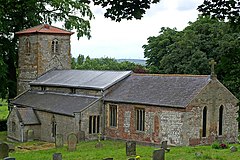Horkstow
| Horkstow | |
|---|---|
 St Maurice Church, Horkstow |
|
| Horkstow shown within Lincolnshire | |
| OS grid reference | TA01982069 |
| • London | 155 mi (249 km) S |
| Unitary authority | |
| Ceremonial county | |
| Region | |
| Country | England |
| Sovereign state | United Kingdom |
| Post town | BARTON-UPON-HUMBER |
| Postcode district | DN18 |
| Dialling code | 01652 |
| Police | Humberside |
| Fire | Humberside |
| Ambulance | East Midlands |
| EU Parliament | Yorkshire and the Humber |
| UK Parliament | |
Horkstow is a village and civil parish in North Lincolnshire, England, 4 miles (6.4 km) south-west from Barton-Upon-Humber, 1 mile (1.6 km) south from South Ferriby and 9 miles (14.5 km) north from Brigg. It lies on the B1204, and 1 mile (1.6 km) east from the navigable River Ancholme. It is one of the five Low Villages - Worlaby, Bonby, Saxby All Saints, Horkstow and South Ferriby - between Brigg and the River Humber, so-called because of their position below the northern edge of the Lincolnshire Wolds. Horkstow was previously part of South Humberside administrative district, and before that, the North Lindsey division of Lindsey, Lincolnshire.
In the Domesday account, the village is referred to as "Horchetou", although the name has gone through various changes since.
The parish church, built by The Knights Templar in the early 12th century, is dedicated to St Maurice, and is Grade I listed. It has been much rebuilt and restored since establishment; an internal restoration was carried out in 1868, and an external in 1895. Other places of worship were the Primitive Methodist and Wesleyan chapels, now converted to other use.
Horkstow’s Grade II listed buildings include 17th- and 18th-century barns, and various houses and cottages. Three Horkstow listed buildings, Manor Farmhouse, Horkstow Hall, and Horkstow Grange, are of particular historic note. Charles Gore was born at Horkstow Hall in 1729, he married well and died at Weimar in German high society.
...
Wikipedia

